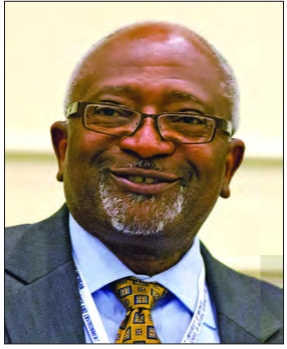
Robert Bullard received the Museum of Science 2024 Bradford Washburn Award.Climate change took center stage Saturday at the Museum of Science, with the institution’s inaugural Boston Youth Climate Summit and the first convening of its new Champions of Environmental Justice series.
The gatherings over the weekend were part of the museum’s “Year of the Earthshot,” its yearlong programming centered on climate solutions, energy and the environment. The events, in which the museum presented environmentalist and sociologist Robert Bullard with an award, drew local and national visitors for discussions on climate change and solutions.
This year has been a notable undertaking for the museum as, in the last two or three decades, the museum has not dedicated an entire year to one singular topic, said Meg Rosenburg, manager of operations for the Centers for Public Science Learning at the museum. This underscores that climate change is “a defining issue of our time,” she said. The sessions on Saturday emphasized this.
The Champions for Environmental Justice meeting was a series of talks and a resource fair that included more than a dozen community organizations. The idea for the gathering came out of a desire to highlight the museum’s community partners, amplify the voices of those involved in environmental justice and connect them with others in the same line of work, said David Sittenfeld, director of the museum’s Center for the Environment.
“The
idea was to … give people hope that there are really great people in
all of these communities working on these problems in positive ways,”
Sittenfeld said, in addition to positioning the museum as a resource for
advocates and community groups.
This
first convening of the Champions of Environmental Justice drew speakers
from the Greater Boston area and from as far as Atlanta and Flint,
Michigan. Sittenfeld said the museum hopes to organize six such events,
tackling topics such as climate justice in tribal nations, land use,
city planning and equitable climate solutions.
“Environmental justice is such a unifying idea. All of us deserve a clean environment, and a
lot of people just don’t realize that it’s not the same for everyone,”
he said. “All of us are feeling, for example, the impacts of climate
change, but not everyone is feeling them equally.”
This
is the crux of Bullard’s research. Over the last 40 years, Bullard,
dubbed “the father of environmental justice,” who is also a professor of
urban planning and environmental
policy at Texas Southern University, has investigated the realities and
effects of climate change on marginalized and vulnerable communities
nationally. In his work, he has examined grassroots movements,
redlining, climate action and urban planning in the likes of Houston,
Atlanta and Louisiana.
On
Friday, Bullard received the museum’s 2024 Bradford Washburn Award,
given to a person “who has made an outstanding contribution toward
public understanding and appreciation of science.”
In his 20-minute speech on
Saturday, Bullard highlighted the interconnectedness of issues like
housing, transportation and health, sounded a siren for urgent action in
the face of climate change and addressed “mounting denial,” delivering a
call to action to audience members.
“Having the science, having the data, having the facts is never enough to make transformative change
that we need to address this climate crisis that’s staring us in the
face,” he said. “We must marry the facts, the data, the research and the
science with action.”
Running
alongside the Champions for Environmental Justice meeting was the
Boston Youth Climate Summit, modeled after that of The Wild Center, a
science museum in upstate New York. The summit began on Friday at the
New England Aquarium and continued on Saturday at the museum, with
dozens of young people attending workshops on topics such as
environmental policy, citizen science and careers.
Rosenburg,
with the museum’s Centers for Public Science Learning, said the youths’
passion was “humbling,” adding that “the ways that young people are
taking in that information and not being passive about what they do with
it is just really incredible.”
Bullard
echoed this sentiment, saying the summit was emblematic of
“intergenerational mobilization,” a necessary component in combatting
the adverse effects of climate change.
“It’s
the young people that are owning the issue of climate justice,
environmental justice,” he said. “That’s what keeps me going, and to see
the energy and vitality that they bring to the issue, it reminds me of
myself in the 1960s when we were challenging the system of racism and
inequality, and we were fearless. And so I see that same parallel energy
now, with the urgency of ‘We need to get it done.’”
Bullard
has spent four decades working in the environmental justice space, and
many of the climate-related issues he wrote about years ago are the same
ones faced today, he said. Still, he said he remains hopeful that the
future is bright.
“The
mere fact that many of these problems have persisted for decades does
not mean that we have not made some impacts,” Bullard said. “That means
we must keep working to eradicate these areas that seem so entrenched.”